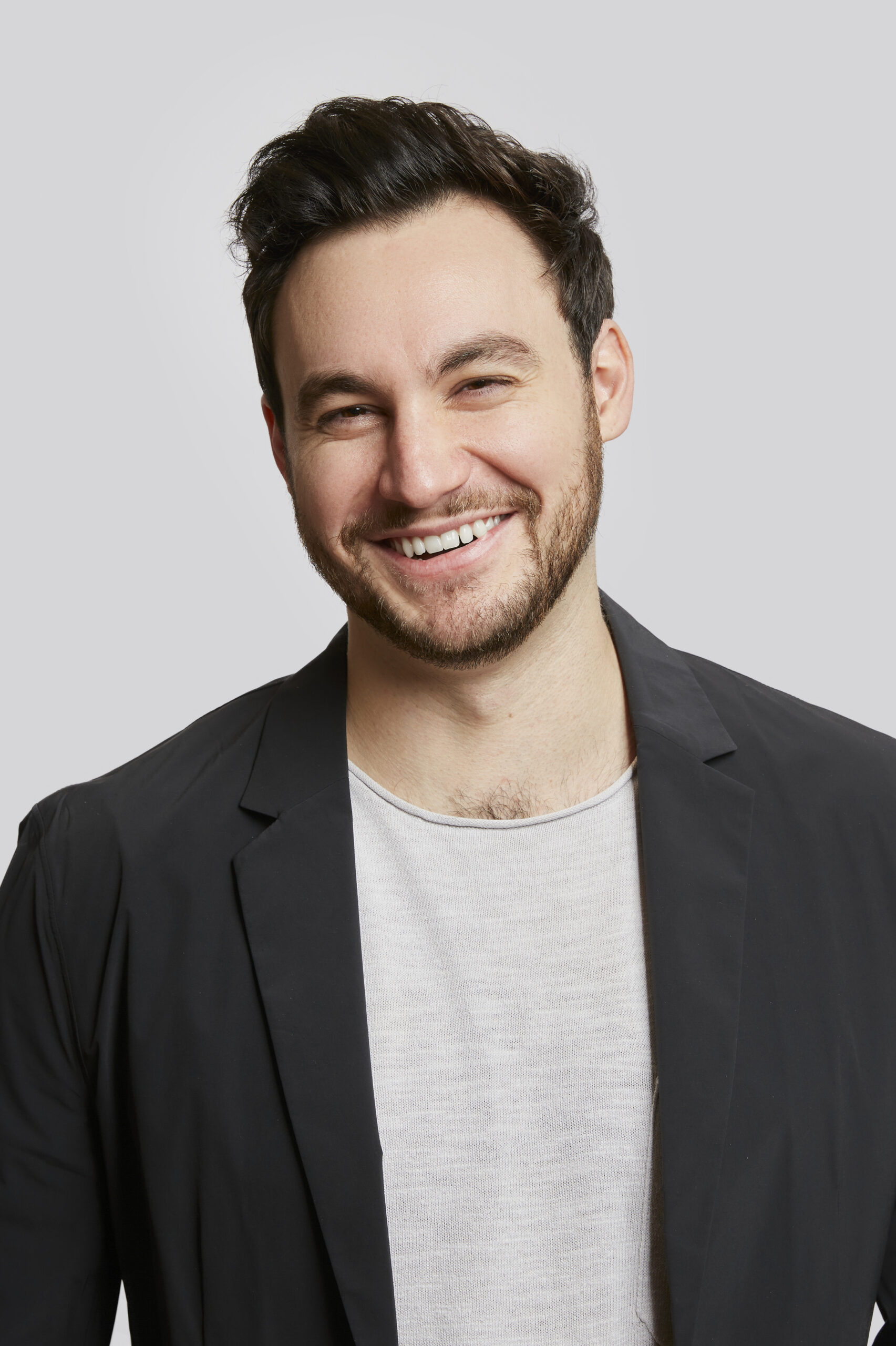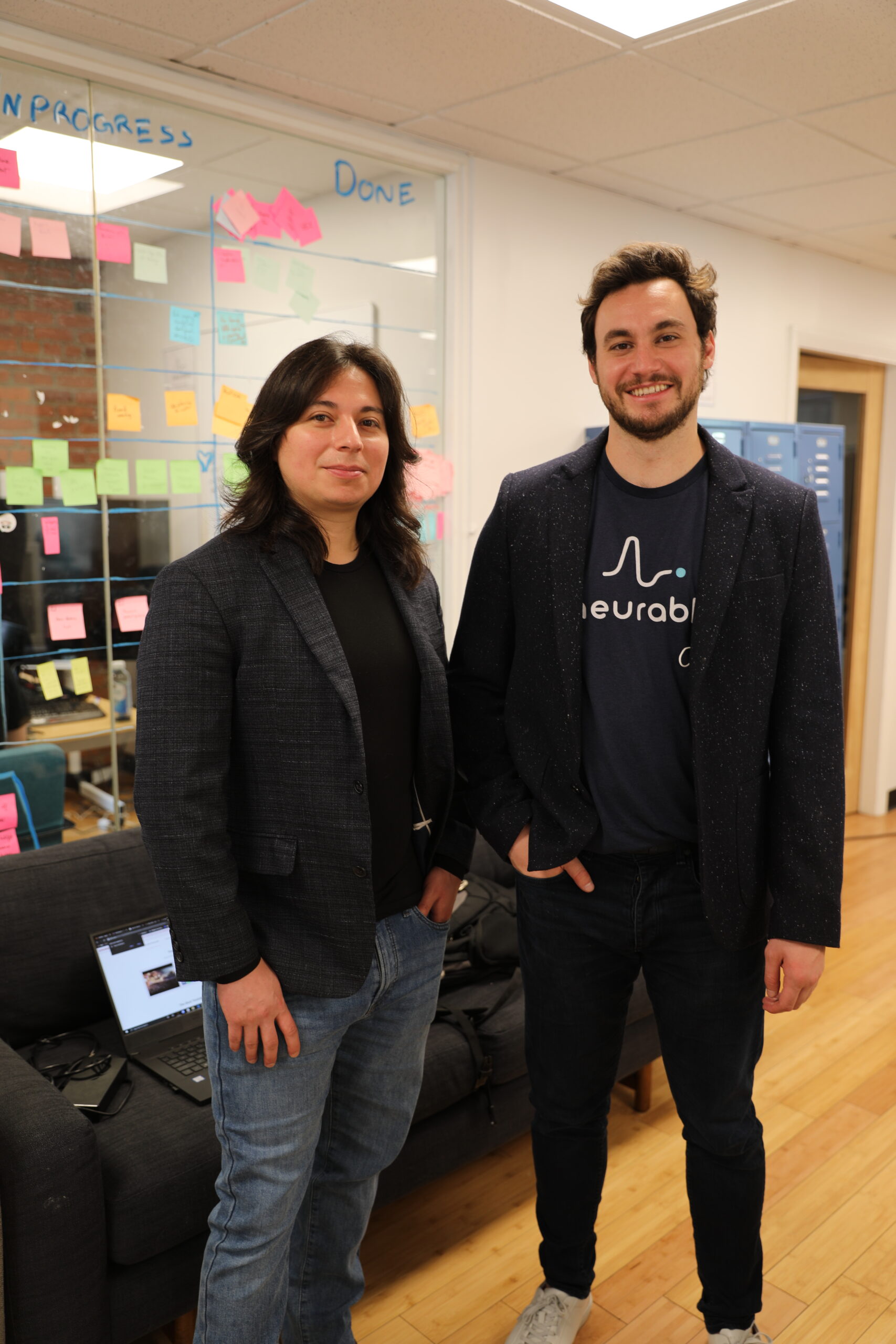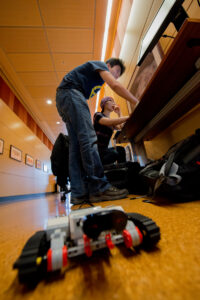By Claudia Capos
While much of the nation was shuttered in 2020 during the height of the coronavirus pandemic, the team at Neurable, a University of Michigan spinout, was hard at work on their latest product innovation.
In April, the Boston-based startup unveiled the prototype for its first consumer-facing product, Enten. Drawn from the Spanish word “entender,” which means to understand, Enten is a pair of wireless Bluetooth headphones equipped with brain-computer interface (BCI) technology that analyzes the brain’s electrical activity and turns intention into action.
 This advanced brain-wave interpretation system provides cognitive feedback that tells users when they are mentally focused and most productive. It also allows them to have hands-free and voice-free control of devices, such as smartphones.
This advanced brain-wave interpretation system provides cognitive feedback that tells users when they are mentally focused and most productive. It also allows them to have hands-free and voice-free control of devices, such as smartphones.
“Our core technology was invented at the University of Michigan’s Direct Brain Interface (DBI) laboratory, and we have taken it forward in our efforts to build the everyday BCI,” says Ramses Alcaide, PhD Neuroscience ’16, co-founder and CEO.
“Our primary goal was not to make a product and send it to market as fast as possible,” he adds. “Instead, we wanted to concentrate on the science and make sure the technology had a wow factor.”
The Zell Lurie Institute at Michigan Ross played a pivotal role in Neurable’s startup success. ZLI entrepreneurs-in-residence and faculty helped Alcaide lay the building blocks for his company. Early and mid-stage investments from the Wolverine Venture Fund, Zell Lurie Commercialization Fund, and Zell Founders Fund provided funding to advance business growth and product development.
Since Neurable’s official launch in March 2015, the company has raised a total of $16 million in venture capital, much of it from Boston-based VC funds and private investors. This “patient capital” has given Neurable a long runway to fine-tune its BCI technology for the consumer market.
“We’re fortunate to have top-tier investors and visionary individuals working with us on the strategic plan for our company,” Alcaide explains. “They understand that other neurotechnology companies have rushed products to market ― only to disappoint both users and investors.”
An Amazing Journey
Now entering its seventh year, Neurable has continued to expand its horizon, tweak its technology, and stretch its boundaries.
 “The journey has been amazing, tough, and worth it,” says co-founder Adam Molnar, BA, PitE ’15, who joined Neurable as a student at Michigan and now is head of partnerships. “U-M helped us lay the foundation that we’ve been building on ever since ― everything from business fundamentals to leading the company toward positive influence.”
“The journey has been amazing, tough, and worth it,” says co-founder Adam Molnar, BA, PitE ’15, who joined Neurable as a student at Michigan and now is head of partnerships. “U-M helped us lay the foundation that we’ve been building on ever since ― everything from business fundamentals to leading the company toward positive influence.”
Neurable’s original mission to build “a world without limitations” remains paramount, but has taken on more definitive nuances over time.
“Our vision has matured and grown to encompass not just physical control around differently enabled individuals but also limitations of the mind,” Molnar says.
The concept for Neurable actually arose from an Alcaide family tragedy. Years ago, a trucking accident severed the legs of Alcaide’s uncle and sparked his passion to help people with disabilities regain their ability to navigate through life.
As a neuroscience Ph.D. candidate, Alcaide worked with Jane Huggins, Ph.D., principal investigator at the Direct Brain Interface laboratory to take brain-computer interface technology from lab to life by developing real-world applications. Initially, he used BCI technology to help children with cerebral palsy take cognitive tests and to enable disabled individuals to adjust an electric-powered wheelchair seat.
Alcaide and Huggins filed their invention with U-M Tech Transfer in 2014. They then tapped the extensive entrepreneurial resources offered by the Zell Lurie Institute, Fast Forward Medical Innovation program, and Center for Entrepreneurship, among others, to devise a commercialization plan, launch a startup company, and accelerate business development.
In 2016, Alcaide and his team made the finals at the Michigan Business Challenge and took home $330,000 in prize money at the Rice Business Plan Competition led by the Rice Owls. That summer, Neurable licensed BCI technology from the University of Michigan and relocated to Cambridge, Massachusetts.
Harnessing Brain Activity
 Neurable’s first offering in the consumer market space was the Developer Kit 1 (DK1), a hardware device that connected with a VIVE virtual-reality product. The startup showcased “The Awakening,” a game that users could control with their minds, at the International Association for Computing Machinery’s 2017 SIGGRAPH conference. It was a solid hit ― but not a home run.
Neurable’s first offering in the consumer market space was the Developer Kit 1 (DK1), a hardware device that connected with a VIVE virtual-reality product. The startup showcased “The Awakening,” a game that users could control with their minds, at the International Association for Computing Machinery’s 2017 SIGGRAPH conference. It was a solid hit ― but not a home run.
“We learned that our technological advancements to miniaturize and reduce the number of sensors (from 64 to 6) and integrate them into a VR headset did not go far enough,” Alcaide says. “Consumers wanted more than a gimmick. They were looking for something that would give them daily value.”
Neurable’s engineering team went back to the drawing board. After a year of R&D, they reduced the technological requirements for the EEG brain-wave sensors worn around the head and integrated the devices into the ear cup of a headphone. The team also created cognitive measurement tools and developed a way to gauge the brain’s emotional state, specifically attention.
The timing for the introduction of Neurable’s Enten headphones couldn’t have been better.
In just one year, the coronavirus pandemic had reshaped where, when, and how people do their jobs. This was a game changer for Neurable.
“Now people work everywhere, so their need for technology to understand how disruptions impact them ― and to minimize those distractions ― is even more important,” Alcaide says. “In addition, individuals are working longer hours and taking fewer breaks. Our technology allows them to be more in tune with their emotional state and to take breaks when their attention wanes.”
To generate market buzz, Neurable launched an Indiegogo crowd-funding campaign for its Enten headphones in April. The startup blew past its $25,000 goal in the first 30 minutes and broke $100,000 in 24 hours.
With a working demo in hand, Neurable’s next step is to jump-start the manufacturing process. Product delivery is targeted for May 2022.
Strong Michigan Ties
Since leaving Ann Arbor, Neurable has maintained strong professional and social ties to the University community.
 “I work with the student investment teams at the Zell Lurie Institute quite a lot,” Alcaide says. “They are highly motivated to make an impact on the startups they back. I also work with U-M Tech Transfer monthly on intellectual property and strategies to grow the value of our nearly 30 patents world-wide. I am fortunate to have so many supporters and mentors who always go above and beyond.”
“I work with the student investment teams at the Zell Lurie Institute quite a lot,” Alcaide says. “They are highly motivated to make an impact on the startups they back. I also work with U-M Tech Transfer monthly on intellectual property and strategies to grow the value of our nearly 30 patents world-wide. I am fortunate to have so many supporters and mentors who always go above and beyond.”
Jane Huggins, of the DBI lab, now serves as the company’s scientific advisor and is helping Alcaide’s team procure grant funding. Another influential mentor is Shane Kelly, MBA ’13, former managing director of the Wolverine Venture Fund and founding partner of Wolverine Angels, a seed investment syndicate.
In addition, the Neurable team has received coaching from Brandon McNaughton, PhD ’07, a tech scientist, entrepreneur, and scientist who teaches entrepreneurship at the U-M Center for Entrepreneurship, and Richard Sheridan, BS Computer Science ’80, MS Computer Engineering ’82, the CEO of Menlo Innovations.
Looking Ahead
Next year’s rollout of Neurable’s Enten headphones is just the tip of the iceberg for the company.
“This product is the vehicle to allow for long-term integration of BCI into everyday life,” Molnar says. “We have many more software updates that will enable other forms of neurotech analytics to better understand yourself. On top of that, we’ll keep providing software updates that enable users to have hands-free and voice-free control of their devices.”
Valuable lessons-learned at the University of Michigan will continue to guide Neurable’s evolution, according to Alcaide.
“Michigan is known for excellence and service,” he says. “That is a big part of our DNA at Neurable, and I believe it will pay off. Our backers made a bet on our company changing the world, and we plan to deliver on our promise of building a world without limitations.”
